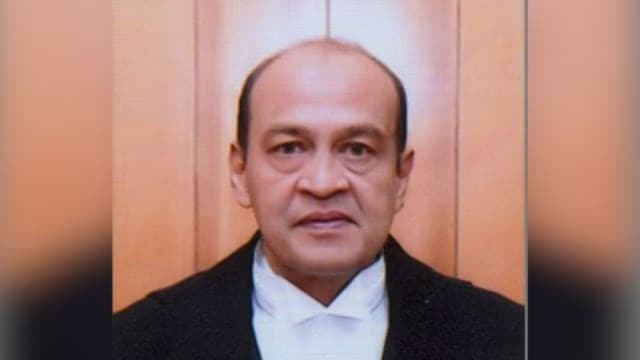Who is Justice Yashwant Varma, the Delhi HC judge in middle of ‘cash recovered at home’ row?
From granting bail to UP doctor Kafeel Khan to rejecting the Congress’s plea against the tax reassessment proceedings initiated against it, Justice Yashwant Varma has ruled on several important cases.
 Justice Varma was appointed as an additional judge at the Allahabad High Court on October 13, 2014, and took oath as permanent judge on February 1, 2016. (Photo Credit: Allahabad High Court)
Justice Varma was appointed as an additional judge at the Allahabad High Court on October 13, 2014, and took oath as permanent judge on February 1, 2016. (Photo Credit: Allahabad High Court)Justice Yashwant Varma of Delhi High Court, whose transfer to Allahabad High Court has been proposed by the Supreme Court Collegium after a report about cash at his residence during a fire last week, was appointed as a judge of the Delhi High Court on October 11, 2021, nearly seven years after he was elevated as judge at his parent court, Allahabad High Court.
At Delhi HC, on the administrative side, Justice Varma is part of at least 11 committees. This includes the ‘administrative and general supervision committee’, as well as ‘Committee for Finance and Budgeting and for sanction of contingent expenditure and writing off losses exceeding Rs 5 lakh’.
He is the chairman of the arbitration Committee of the Delhi International Arbitration Centre, and also of the Delhi HC Legal Services Committee
He was also among the three judges part of the permanent committee, headed by former Delhi HC Chief Justice Manmohan, which decided on the conferment of designated senior advocates at Delhi HC last year.
Justice Varma pursued law at Madhya Pradesh and enrolled as an advocate in 1992. In his practice at Allahabad HC, he dealt with constitutional, labour and industrial legislations, as well as corporate laws and taxation. As a judge at Allahabad HC, in the seven-year tenure, Justice Varma presided over various jurisdictions including constitutional law, taxation, arbitration and criminal matters.
Justice Varma was the special counsel for the Allahabad HC from 2006 until his elevation as an additional judge of the Allahabad HC in October 2014. He also held the office of the chief standing counsel for the state of Uttar Pradesh at Allahabad HC from 2012 till August 2013 when he was designated as a senior advocate by the Allahabad HC.
A key verdict was in 2018 where Justice Varma granted bail to Dr. Kafeel Khan, after nearly 7 months of incarceration, who had been accused of medical negligence by the UP government after 63 children and 18 adults died due to a failure to provide medical oxygen a year earlier.
He was appointed as an additional judge at the Allahabad HC on October 13, 2014 and took oath as permanent judge at Allahabad HC on February 1, 2016.
In his nearly three-and-half year tenure at the Delhi HC, Justice Varma has decided on several important taxation-related cases, including the decision to reject the Congress party’s plea challenging the tax-reassessment proceedings initiated against the party in March 2024. It found that the income tax authorities had collected “substantial and concrete evidence warranting further scrutiny and examination” and also considered that approximately Rs. 520 crores in income tax had “escaped assessment”.
Recently in October 2024, Justice Varma refused to interfere in petitions filed by Airports Authority of India against arbitral awards granted in disputes with Mumbai International Airport Ltd and Delhi International Airport Ltd, and dismissed the same under the Arbitration and Conciliation Act. Justice Varma held that while evaluating a challenge under Section 34 would not be justified in faulting an award merely because an alternative view was possible or where they find that, in their opinion and when independently evaluated, a more just conclusion could have been possibly reached.
In 2023, Justice Varma, heading a two-judge division bench, ruled that gold was a ‘prohibited item’ for import under the Customs Act, 1962. He said the word “prohibition” in the Customs Act also includes goods that are restricted or regulated under the Act such as gold.
In the main opinion, which Justice varma signed off on, the court also took note of how customs authorities have handled import-related issues in the past, stating “It is our experience that at times the authorities concerned have manifestly exercised their powers arbitrarily in matters of assessment and levy of duty, imposition of fine and/or penalty besides release/redemption of the confiscated gold. Such arbitrariness leaves much to be desired in terms of transparency, equity and fair play in action, which does not augur well to realize the constitutional aim of maintaining rule of law in the country.”
That same year, Justice Varma heading a division bench, upheld a single-judge’s order ruling that the celebrated Bengali director Satyajit Ray was the original copyright owner of the 1966 film “Nayak”. An appeal had been filed by R D Bansal, the ‘Karta’ of RDB and Co. (HUF) which commissioned the film, who sought to restrain publishing house Harper Collins from novelising the script for the movie Nayak. The court ruled that the movie “had been authored and scripted by the Late Mr. Satyajit Ray and consequently the copyright therein would vest in the said individual alone”.
In 2022, Justice Varma also clarified the law related to gun ownership, ruling that licensed individuals cannot own more than two firearms under the Arms Act, 1959, even if they are a member of a Rifles Association or a Club. In this case, the court ruled that “neither the Constitution nor the Act confers an indefeasible right upon citizens to hold, possess or bear firearms”. Even though the Act exempts “any member of a rifle club or rifle association”, Justice Varma noted that it would lead to “absurd results” if a person is allowed to hold “any number of firearms” as this would put these individuals on par with arms dealers and rifle associations.







